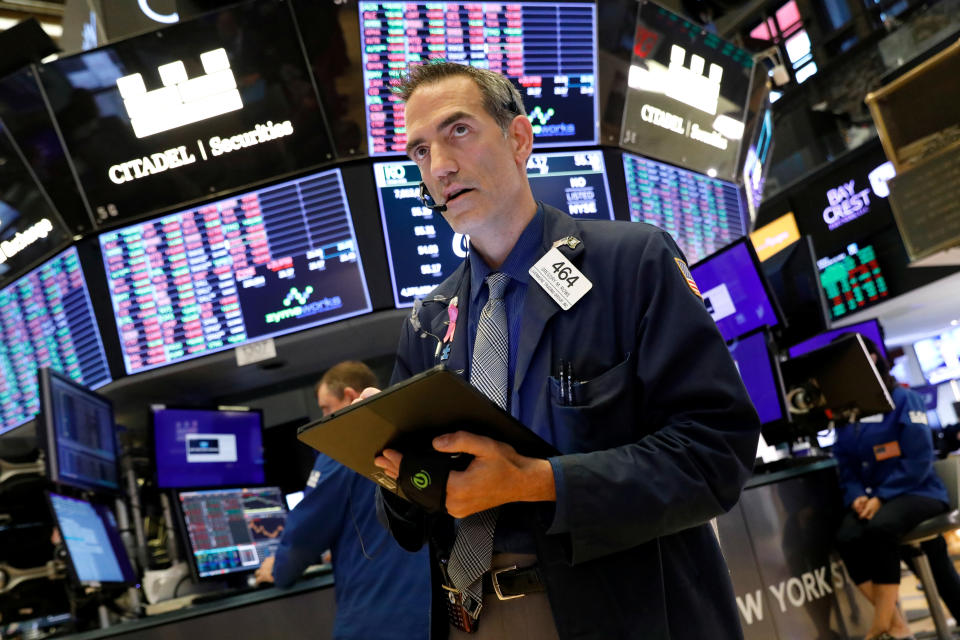Stock market news: September 13, 2019
The Dow posted an eighth consecutive session of gains amid further signs of de-escalation in the U.S.-China trade war. While the S&P 500 and Nasdaq ended Friday’s session lower, all three major indices posted weekly advances for a third straight week.
Meanwhile, U.S. Treasury yields continued to march higher, with the 10-year yield recovering from a three-year low of 1.43% reached earlier this month to rise above 1.90%. This came even after the European Central Bank (ECB) unveiled a package of new stimulus measures Thursday, including a cut to the bank’s key deposit rate. The ECB also announced it would be relaunching a quantitative easing program to help shore up the flagging eurozone economy.
Here were the main moves in the market at the end of regular trading:
S&P 500 (^GSPC): -0.08%, or 2.44 points
Dow (^DJI): +0.12%, or 34.79 points
Nasdaq (^IXIC): -0.22%, or 17.75 points
10-year Treasury yield (^TNX): +11.2 bps to 1.903%
Gold (GC=F): -0.84% to $1,496.70 per ounce
The Chinese government is encouraging companies to buy “a certain amount” of U.S. farm products including pork and soybeans and will exempt these goods from additional tariffs, China’s official Xinhua News Agency said Friday. This corroborates President Donald Trump’s earlier assertion via Twitter post Thursday that “It is expected that China will be buying large amounts of our agricultural products.”
Such a move would provide some respite to U.S. farmers, who have become one of the biggest casualties in the trade war with China. It would also be viewed as a major gesture of good will, with Trump having repeatedly lambasted Beijing for failing to follow through on promises, including upping purchases of U.S. farm products. The country had ceased purchases in August in an apparent retaliatory move after Trump announced further tariffs on Chinese imports.
This all comes after some Trump administration officials were reported Thursday to be mulling an interim trade deal with China to de-escalate tensions ahead of another round of trade talks in October. In remarks to reporters, Trump said he “would consider” a temporary deal, but would prefer a more permanent agreement.
Throughout the week, the U.S. and China have been exchanging olive branches in moves to de-escalate the trade war, which has taken a bite out of both countries’ economies. Earlier Trump pushed back the implementation date for additional tariffs on Chinese imports to Oct. 15, two weeks later than previously announced, after China generated a list of 16 U.S. product categories to be exempted from new tariffs.
“By most accounts, Beijing’s decision to selectively reduce some tariffs earlier this week was driven by domestic concerns, though President Trump responded quite favorably by interpreting the move as an ‘important gesture,’” Cowen analyst Chris Krueger wrote in a note Friday. “Regardless, the goalposts have been moved many a time and the lack of bad news could well be interpreted by market participants as good news.”

Retail sales rose more-than-expected in August
A broad measure of retail sales rose at a greater-than-expected rate in August, driven by sales from internet retailers, building materials sellers and auto dealers.
Headline retail sales rose 0.4% in August, the Commerce Department reported Friday, versus a 0.2% gain expected, according to Bloomberg-compiled data.
Excluding autos and gas sales, retail sales rose just 0.1% for the month, missing expectations for a 0.2% gain and coming off a 0.9% increase in July. Excluding motor vehicles and parts sales alone, retail sales were flat for the month, versus a 0.1% increase expected and 1.0% gain in July.
August’s figures come on the heels of a much stronger-than-expected report from July, when headline retail sales rose an upwardly revised 0.8% for the month. Gains for July had been broad-based, driven by strong sales from e-commerce platforms, grocery stores and clothing retailers.
While Friday’s report marked a pullback from July’s print, the results still point to intact consumer activity even amid an ongoing trade war and fears of an economic slowdown. Consumer spending drives about 70% of U.S. economic output, and retail sales comprise about 25% of personal consumption expenditures.
“Consumers remain the locomotive of the economy, and with labor markets still looking healthy and financial conditions remaining accommodative there is little reason to expect a near-term retrenchment in retail spending,” Michael Feroli, JPMorgan chief U.S. economist, wrote in a note.
The Commerce Department’s latest retail sales report is the last major piece of economic data before the Federal Reserve kicks off its next two-day policy setting meeting on Tuesday.
Consumer sentiment rebounded in September: U. Michigan Survey
Consumer sentiment improved in September after a sharp drop-off in August, according to the preliminary results from the University of Michigan’s closely watched monthly Survey of Consumers.
The headline index for consumer sentiments rose to 92.0 for the month, ahead of consensus expectations for 90.8, and last month’s reading of 89.8.
Subindices tracking consumers’ assessments of current and future economic conditions also rose from August, but each missed expectations.
Meanwhile, concerns over the impact of tariffs on the U.S. economy rose in early September, with the percentage of consumers spontaneously citing tariffs in the survey climbing to 38%, or the highest level since March 2018.
“Those who negatively mentioned tariffs also held more negative views on the overall outlook for the economy as well as anticipated higher inflation and unemployment in the year ahead,” Richard Curtin, University of Michigan Surveys of Consumers chief economist, wrote in a note.
—
Emily McCormick is a reporter for Yahoo Finance. Follow her on Twitter: @emily_mcck
Read more from Emily:
There won’t be ‘billion-dollar beverage brands’ in the future: Iris Nova CEO
Iris Nova CEO calls his company the ‘Netflix’ of the beverage space
Tech companies like Lyft want your money – not ‘your opinion’
Follow Yahoo Finance on Twitter, Facebook, Instagram, Flipboard, LinkedIn, and reddit.
Read the latest financial and business news from Yahoo Finance

 Yahoo Finance
Yahoo Finance 

